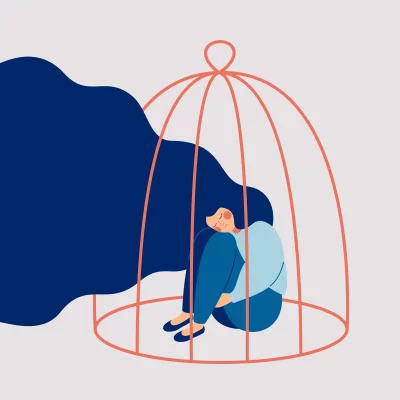Have you ever felt like you were dealing with someone who is so self-centered and entitled that it’s hard to reason with them?
Has this led you to feel like you’re in a one-sided relationship where your needs and feelings are constantly being disregarded?
If this sounds familiar, then you may be dealing with someone with narcissism. Keep reading to learn how to deal with a narcissist.
Dealing with a narcissist can be an incredibly draining and challenging experience. Narcissism is characterized by their pattern of grandiose behavior, feelings of superiority, entitlement, and lack of empathy towards others. While they may exhibit signs of kindness or even love at times, these actions will never come without strings attached – often leading to further manipulation and abuse.
This article will discuss the ins and outs of recognizing a narcissist in your life, the effects of narcissism, how people become narcissists, tips for how to deal with a narcissist, and more.
How to Recognize a Narcissist
Narcissists often use a variety of controlling tactics to manipulate you. Those with tendencies of narcissism act out of self-interest, using you as an object to bolster their ego or gain a sense of power within the relationship.
Narcissistic behavior can take many forms, including:
- Controlling language
- Gaslighting
- Invalidating emotions
- Refusing to take responsibility for one’s actions
For example, narcissists may use language to control or belittle you, gaslight you by making you doubt your reality and thoughts, invalidate how you feel to make themselves seem superior, and refuse to accept accountability for the wrongs they have done.
People who can be narcissists in your life include:
- Parents: this can look like parental alienation or a parent who always puts their own needs first and disregards how it affects you.
- Other family members: this could be a sibling or an extended family member who is always trying to control how you live your life and how you view them.
- Friends: this can be a friend constantly putting you down or making you feel bad about how you look, how much money you have, or how successful you are.
- Coworkers: this can take the form of a boss or coworker who is always taking credit for your work and making you feel like you don’t belong in the office.
- Romantic partners: this can be a partner who is always trying to control how you dress, how you spend your time, or how much time they get to spend with you.
The Effects of Narcissism
Being in a relationship with a person exhibiting narcissistic traits can have a lasting effect on your mental health.
Emotions you may feel if you are in a relationship with a narcissist may include:
- Drained
- Helpless
- Worthless
- Isolated
- Anxious
- Depressed
- Paranoid
- Self-doubt
- Self-hate
- Panic Attacks
- Suicidal thoughts
With tactics such as gaslighting, you can also feel like you are going crazy because the narcissist will lead you to doubt who you are, what you have said, or things you have done.
Victims of narcissistic abuse to experience physical symptoms such as:
- Chronic headaches,
- Fatigue
- Stomach problems
- Insomnia
Physical symptoms could also include bruises or other physical signs of abuse.
If you or someone you know is being physically abused, call the National Domestic Violence Hotline: 800-799-7233.
How People Become Narcissistic
Narcissism is not something that develops overnight. It is usually caused by how a person was raised and treated as a child. People who were neglected, abused, and invalidated as a child may grow into adults who display narcissistic behavior in their relationships.
Narcissists have a higher level of activity in their frontal lobe, which is the part of the brain responsible for impulse control and decision-making. This area is also associated with how people perceive themselves and interact with others. This means that narcissists have difficulty controlling how they behave and how they perceive themselves in relation to others.
Narcissists may not know how to recognize how their behavior impacts those around them, often leading them to continue on the same destructive path without seeing a need to change their behavior. They might not even know that what they are doing is wrong until someone points it out to them.
Regardless of if they understand their impact on the world around them, they are still responsible for their behaviors and actions.
On the other hand, there are many narcissists who understand fully what they are doing and the damage they are inflicting on others. These actions may be their attempt to have their own needs met.
Whether they believe their needs will not be met unless they use manipulation, or they like the sense of control they have over another person, giving them the perception of control over their own life, it is evident that the effects of this type of behavior on others is highly stressful and difficult to take.
How to Deal with a Narcissist
If there is a narcissist in your life, and you’re wondering how to deal with a narcissist, it is important to incorporate some of the following tips to start to break the chains they have over you.
Tips for dealing with a narcissist in conversation include:
- Set boundaries: Narcissists are known for crossing boundaries and disrespecting others’ personal space. It is important to set clear boundaries and stick to them, even if the narcissist tries to manipulate or guilt trip you.
- Avoid arguments: Arguing with a narcissist is often futile as they will always try to make themselves appear superior. Instead of engaging in arguments, try to stay calm and use a neutral tone in conversation.
- Focus on facts: Avoiding personal attacks, emotional responses, and sticking to facts during conversation takes away the emotional impact that a narcissist craves.
- Disengage from the conversation: If the conversation or argument because too emotionally draining or unproductive, consider disengaging from the conversation, if possible. This, again, cuts off the supply of emotional energy the narcissist wants and preserves you in the process.
- Seek support: Dealing with a narcissist can be emotionally draining, and it is important to have a support system in place. This can include friends, family, and therapy to help you cope with the difficult situation.
- Practice self-care: It is crucial to take care of yourself when dealing with a narcissist. Make sure to prioritize your own well-being and engage in activities that bring you joy and relaxation.
- Educate yourself: Understanding narcissistic personality disorder can help you better navigate the situation. Educate yourself on their behaviors and tactics, so you can be better prepared to handle and avoid them.
Remember, it is not your responsibility to change or fix a narcissist. It is important to prioritize your own well-being and safety when dealing with them. You deserve to be treated with respect and compassion. If someone is mistreating you, utilize these tips to empower yourself and break free from the hold a narcissist may have over you. This is not an easy process, so lean on your support system to lift you up when times get tough.
Already in a Relationship With a Narcissist?
Realizing that you are in an unhealthy relationship can be difficult but needed if you want to protect yourself from further manipulation and pain. Unfortunately, the process of leaving may be more complicated than one might think. This could look like guilt-tripping, threatening you, isolating you from friends and family, or refusing to communicate with you.
First, talk to someone you trust about your plan to leave. If your partner is being violent or you are scared to leave, contact your “Safe” person, your therapist, or contact the National Domestic Violence Hotline. You can call 800-799-Safe (7233), text “START” to 88788, or go to their website to use the chat option.
Remember that it is not your fault; the person with narcissism is the one responsible for how they are behaving. Taking this journey one step at a time is key to protecting your mental health and wellbeing.
How to Heal After Leaving A Narcissist
Healing from the effects of being in a narcissistic relationship can be a lengthy process. It is important to accept and forgive yourself for how you were treated, how you might have acted in the relationship, and any thoughts that you could or should have prevented the entire situation.
Tips for Healing after a Narcissistic Relationship include:
- Seek therapy: Narcissistic relationships can have a lasting impact on your mental health. Therapy can help you process your emotions, heal from any trauma, and learn healthy coping mechanisms that friends and family aren’t fully equipped to offer.
- Surround yourself with supportive people: Friends and family can help you navigate negative thoughts and emotions you may experience, as well as help you create new, happier, and positive memories.
- Practice self-care: Take time to focus on self-care activities that help you feel happy, soothed, relaxed, and that boost your self-esteem and confidence, which may have been diminished during the relationship.
- Keep practice setting boundaries: If you created boundaries or ended the narcissistic relationship all together, understand that this is the beginning of expressing and upholding your boundaries. If you are unsure what healthy boundaries or relationships look like, your therapist can help you understand what is important to you and how to stick to them, even if someone tries to challenge them. This practice may help prevent narcissistic relationships in the future.
- Practice mindfulness: Mindfulness can help you stay grounded in the present moment and manage any overwhelming emotions or thoughts that may arise from the past relationship.
- Be patient with yourself: Healing after a narcissistic relationship takes time. Be patient with yourself and allow yourself to feel all of your emotions without judgment.
- Let go of guilt and shame: It’s common for you to feel guilty or ashamed for not leaving your relationship sooner. Remember that it is never your fault for being in an abusive relationship and focus on moving forward.
- Explore new hobbies or activities: When you are in a narcissistic relationship, everything revolves around that person. It is easy to completely lose all sense of who you are and what you enjoy. Try new hobbies or activities that sound fun and interesting to you. This is the time to focus on yourself and find joy in your everyday life.
- Set goals for the future: Having a sense of purpose and direction can be incredibly empowering when healing from a narcissistic relationship. Set achievable goals for yourself and work towards them at your own pace.
Conclusion
At Makin Wellness, we understand how difficult it can be for you to deal with a narcissist or heal after being affected by one. Speaking to one of our trained therapists can be incredibly helpful in this healing process. Our online therapy sessions help to provide coping strategies to effectively work through the strong feelings and emotions that come with being in abusive and narcissistic relationships.
We hope this blog post has been helpful to those dealing with a narcissist in their lives. If the information contained within has given you insight or comfort, please consider sharing it with others who may be going through something similar. Remember that you are never alone – Makin Wellness is here for you, and we want to offer our support in any way we can!
Our team is here to provide guidance and help you feel empowered and work toward healing. Call us at (833)-274-heal or schedule an online appointment today to start your journey toward healing today.








